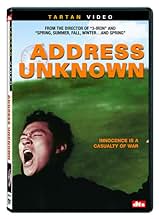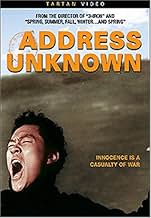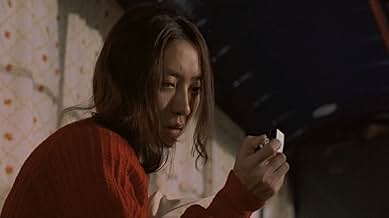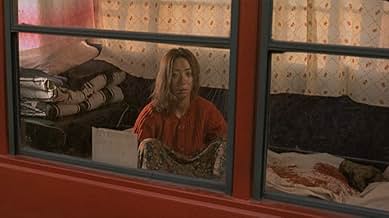VALUTAZIONE IMDb
7,2/10
4028
LA TUA VALUTAZIONE
I romanzi finiscono nel sangue e le fragili speranze degli individui vengono lacerate in una vile continuità karmica di colonialismo, guerra civile e occupazione.I romanzi finiscono nel sangue e le fragili speranze degli individui vengono lacerate in una vile continuità karmica di colonialismo, guerra civile e occupazione.I romanzi finiscono nel sangue e le fragili speranze degli individui vengono lacerate in una vile continuità karmica di colonialismo, guerra civile e occupazione.
- Regia
- Sceneggiatura
- Star
- Premi
- 4 vittorie e 5 candidature totali
Recensioni in evidenza
I love this movie! OK, it's horrible, it's disgusting, watching it made
me sick...and saying that I experienced physical pain is not a lie.
There is no happiness in this film. Everyone is depressed and
everyone has difficult problems to deal with, and those problems
don't get solved, but rather get worse during the film. But this is
why I love it! A film that can give you such strong feelings, even if
the strong feelings are depression and pain, is a GOOD film!
Might be good to see this if you think YOU have problems. =)
me sick...and saying that I experienced physical pain is not a lie.
There is no happiness in this film. Everyone is depressed and
everyone has difficult problems to deal with, and those problems
don't get solved, but rather get worse during the film. But this is
why I love it! A film that can give you such strong feelings, even if
the strong feelings are depression and pain, is a GOOD film!
Might be good to see this if you think YOU have problems. =)
Do you love animals? Have you ever ate dog meat? Beware, this film can make you nauseous. This film has an outer cover of a very light drama. But, remember, this is a Kim Ki-duk movie, so intense and deeply emotional. I really love his films for the fact that how creative he is around emotions and creating situations that breaks the cliché and our expectations. Amazing movie.
Call me strange, but Kim Ki-Duk's THE ISLE is one of my favourite Korean movies. Not just the beautiful imagery, not just those scenes that had people fainting in the theatres, but because I empathised a lot with the characters, and the symbolism of their environment and their actions was very much in tune with my sensibilities. OK, so I'm strange .
Much as I enjoyed watching it, I won't try and argue that watching THE ISLE is a 'pleasant' experience - not one to leave you with a smile, so I was prepared for something a little bit serious and grim with ADDRESS UNKNOWN.
It is not a little bit serious and grim at all... it is *completely* serious and amazingly grim.
Kim Ki-Duk is less interested in exploring the somewhat global issues of human feelings here, but instead wants to explore the feelings of a nation - Korea, still living in the shadow of the Korean war. The characters here come across as a little apersonal (it's ok, I just invented it) because they are embodiments of the country's experience... the division, the loss of autonomy, the dehumanisation that people feel, caught up in the conflicts between North and South and between Capitalism and Communism. Obviously to suggest that this was a universal Korean experience would be unreasonable, though Kim Ki-Duk is not interested in exploring balancing factors in this particular movie. People suffer. And suffer. And suffer. And then they suffer for a while. He is relentless in his examination of the pain that he clearly feels, for himself and for his country.
It must be said that I know almost nothing about Korean history (though I am learning a lot as I type!), or of contemporary Korean society, so I don't know how common the feelings that Kim Ki Duk expresses here are, or how realistic his assessment of Korea's post war condition is. It all feels very believable, very convincing... but certainly none of the Korean people I have met are quite as utterly miserable as they must be if ADDRESS UNKNOWN were an accurate depiction of their lives.
I think there is no doubt that for at least some people, and some communities, the feelings that Kim Ki Duk brings to the fore in the movie represent real feelings and real situations. But I think that it must be assumed that it is not an even-handed assessment of the situation, that he was quite certain what he wanted to say and permitted no deviation from it. In a way this is the movie's undoing... it is so relentless in its pursuit that it becomes too easy to get detached from it, to treat it as political allegory rather than a tale of human hardship. A little more warmth, a little bit of humour, maybe just one or two moments where at least one character was *slightly* happy... and I would have been much more able to bond with them, and their tragedies and miseries would have been that much more poignant as a result.
A fairly small matter, and to a degree this observation may simply be an observation that I am not Korean. The movie is a very personal look at the feelings and circumstances of a nation, and having had no comparable experience myself, it is obvious that I'm going to struggle to fully relate.
If I couldn't empathise with the characters though, I could at least sympathise with them. The characters themselves were good characters, and the performances were mostly very good. Notable exceptions are the American soldiers in the movie, whose English dialogue and delivery is really quite embarrassingly bad The movie is very light on dialogue - little that is important is expressed through words, because it doesn't need to be. Always a good thing in a movie.
It is the younger characters of the movie that are centre stage, those who were born years after the Korean war ended, but are still suffering its consequences. It's always refreshing to see young actors deliver mature performances, and this is one such example.
THE ISLE probably impacted me mostly because of the visuals - the beautifully photographed and haunting environment in which the movie took place. ADDRESS UNKNOWN is not nearly as pretty, which can partly be based on location, but also the fact that the style is a lot more realistic, gritty even, as opposed to THE ISLE's abstractness. It is still well filmed though.
I wrote of THE ISLE after seeing it:
"if you want to take away the beauty of his film, you have to be willing to pay the price of the horror"
ADDRESS UNKNOWN is a less successful movie for me because once you get past it's horror, instead of beauty you find there's just a bit more horror . OK, it's not as bad as that... but the tone is quite unremittingly bleak. I don't know whether to recommend the movie or not. I liked it, but I'm not sure how many others will. Definitely not a movie to put on to take your mind off a troublesome day anyway!
Much as I enjoyed watching it, I won't try and argue that watching THE ISLE is a 'pleasant' experience - not one to leave you with a smile, so I was prepared for something a little bit serious and grim with ADDRESS UNKNOWN.
It is not a little bit serious and grim at all... it is *completely* serious and amazingly grim.
Kim Ki-Duk is less interested in exploring the somewhat global issues of human feelings here, but instead wants to explore the feelings of a nation - Korea, still living in the shadow of the Korean war. The characters here come across as a little apersonal (it's ok, I just invented it) because they are embodiments of the country's experience... the division, the loss of autonomy, the dehumanisation that people feel, caught up in the conflicts between North and South and between Capitalism and Communism. Obviously to suggest that this was a universal Korean experience would be unreasonable, though Kim Ki-Duk is not interested in exploring balancing factors in this particular movie. People suffer. And suffer. And suffer. And then they suffer for a while. He is relentless in his examination of the pain that he clearly feels, for himself and for his country.
It must be said that I know almost nothing about Korean history (though I am learning a lot as I type!), or of contemporary Korean society, so I don't know how common the feelings that Kim Ki Duk expresses here are, or how realistic his assessment of Korea's post war condition is. It all feels very believable, very convincing... but certainly none of the Korean people I have met are quite as utterly miserable as they must be if ADDRESS UNKNOWN were an accurate depiction of their lives.
I think there is no doubt that for at least some people, and some communities, the feelings that Kim Ki Duk brings to the fore in the movie represent real feelings and real situations. But I think that it must be assumed that it is not an even-handed assessment of the situation, that he was quite certain what he wanted to say and permitted no deviation from it. In a way this is the movie's undoing... it is so relentless in its pursuit that it becomes too easy to get detached from it, to treat it as political allegory rather than a tale of human hardship. A little more warmth, a little bit of humour, maybe just one or two moments where at least one character was *slightly* happy... and I would have been much more able to bond with them, and their tragedies and miseries would have been that much more poignant as a result.
A fairly small matter, and to a degree this observation may simply be an observation that I am not Korean. The movie is a very personal look at the feelings and circumstances of a nation, and having had no comparable experience myself, it is obvious that I'm going to struggle to fully relate.
If I couldn't empathise with the characters though, I could at least sympathise with them. The characters themselves were good characters, and the performances were mostly very good. Notable exceptions are the American soldiers in the movie, whose English dialogue and delivery is really quite embarrassingly bad The movie is very light on dialogue - little that is important is expressed through words, because it doesn't need to be. Always a good thing in a movie.
It is the younger characters of the movie that are centre stage, those who were born years after the Korean war ended, but are still suffering its consequences. It's always refreshing to see young actors deliver mature performances, and this is one such example.
THE ISLE probably impacted me mostly because of the visuals - the beautifully photographed and haunting environment in which the movie took place. ADDRESS UNKNOWN is not nearly as pretty, which can partly be based on location, but also the fact that the style is a lot more realistic, gritty even, as opposed to THE ISLE's abstractness. It is still well filmed though.
I wrote of THE ISLE after seeing it:
"if you want to take away the beauty of his film, you have to be willing to pay the price of the horror"
ADDRESS UNKNOWN is a less successful movie for me because once you get past it's horror, instead of beauty you find there's just a bit more horror . OK, it's not as bad as that... but the tone is quite unremittingly bleak. I don't know whether to recommend the movie or not. I liked it, but I'm not sure how many others will. Definitely not a movie to put on to take your mind off a troublesome day anyway!
This is gritty and bleak realism at its best. We are in a countryside village on the border to North-Korea were poverty and war (both the Korean war and the continuation of the cold war) takes its toll on the villagers. Prospects are none, but some think of America as one and therefore learns English. This also provides some of the small pieces of comedy in the movie, for example when some youngsters try to translate from a hustler magazine or when two bullies are tough with speaking English with strong Korean accent; Koreans have trouble pronouncing f for instance.. Some other comedy is the US army battalion running and crawling everywhere and the war veteran crazy for medals always bragging about killing 3 commies.
Anyway this very grim and bleak realism is obviously made as a political commentary. I don't blame any of them, they are victims of their circumstances. I sympathize with every one of them. Kim Ki-Duk don't blame anyone either, the Americans are portrayed as human, not as heroes nor devils, but the theme of globalization and colonization still lies implied in the movie. Actually its full of commentary. I wont get into it here.
I know there's a big difference between countryside Korea and big city Korea, but even though I cant say if its real or not, I believe this to be quite realistic. The utter consequences the movie depicts of course is fiction and made to emphasize the horror and drama, this is a movie after all.
This was not very well received in Korea and understandably so, it takes up problems that are very actual today and brings up a painful past. To get rid of these problems it is very important however, that someone like Kim Ki-Duk makes these kind of movies and for people to see them. So go see it!! But its not a pleasant watch.
Anyway this very grim and bleak realism is obviously made as a political commentary. I don't blame any of them, they are victims of their circumstances. I sympathize with every one of them. Kim Ki-Duk don't blame anyone either, the Americans are portrayed as human, not as heroes nor devils, but the theme of globalization and colonization still lies implied in the movie. Actually its full of commentary. I wont get into it here.
I know there's a big difference between countryside Korea and big city Korea, but even though I cant say if its real or not, I believe this to be quite realistic. The utter consequences the movie depicts of course is fiction and made to emphasize the horror and drama, this is a movie after all.
This was not very well received in Korea and understandably so, it takes up problems that are very actual today and brings up a painful past. To get rid of these problems it is very important however, that someone like Kim Ki-Duk makes these kind of movies and for people to see them. So go see it!! But its not a pleasant watch.
There's a scene in this film where a man plays with a puppy. When the puppy, wagging its tail, approaches, the man, at first affectionate, slaps its nose. Two or three times. It is the most heartless moment in a cruel and vacuous movie. The cruelty is everywhere and stops the audience caring about anyone or anything. Except the dogs. Couple of questions. How does a bullet in the eye get fixed with what looks like soy sauce? Since when did a traditional Korean family allow a teenage daughter to bonk her U.S. soldier boyfriend in the family home? And where did the director drag up those American actors? Friday night in Itaewon? Boy oh boy they were bad. The boyfriend was bad, out of control and saying truly scary things. He blamed it all on the Korean mountains that were closing in on him. Hello? Calling Planet Earth? On top of that, in a movie set in the 1970s, no period pop music. Unforgivable. A real dog.
Lo sapevi?
- ConnessioniReferenced in Arirang (2011)
I più visti
Accedi per valutare e creare un elenco di titoli salvati per ottenere consigli personalizzati
- How long is Address Unknown?Powered by Alexa
Dettagli
- Tempo di esecuzione1 ora 57 minuti
- Colore
- Proporzioni
- 1.78 : 1
Contribuisci a questa pagina
Suggerisci una modifica o aggiungi i contenuti mancanti

Divario superiore
What is the English language plot outline for Indirizzo sconosciuto (2001)?
Rispondi

























